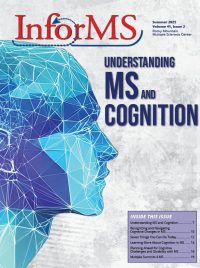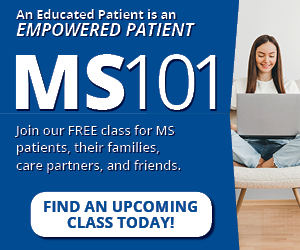
An Interview with Neuropsychologist Dr. Brian Hoyt
Dr. Brian Hoyt is a board-certified clinical neuropsychologist and the Head of the Division of Neuropsychology in the Department of Neurosurgery at the University of Colorado School of Medicine.
InforMS: What kinds of cognitive changes are most commonly seen in people with MS?
Dr. Bryan Hoyt: The most common cognitive change in people with MS is a slowdown in processing speed — how quickly the brain can take in and respond to information. This often affects related areas such as attention, distractibility, multitasking, and memory retrieval.
In many cases, the learning and memory systems themselves are still functioning well — people are able to learn and retain new information — but they may struggle to access it efficiently. With the right strategies, including cues and reminders, we can often help individuals retrieve stored information more effectively. Some people may also experience higher-level cognitive challenges involving executive function, such as reasoning, planning, and complex problem-solving.
We know that approximately 45% to 65% of individuals with MS experience some degree of cognitive difficulty. About 20% to 25% experience cognitive impairment that significantly impacts daily functioning. The majority of changes are more subtle and tend to occur within the domains I’ve just described.
InforMS: At what point do those symptoms typically appear? Can they be an early sign or indication of MS, or do they appear later on, generally?
Dr. Hoyt: Just like every other MS symptom, every patient is unique, and they all have their own version of the disease. Cognitive symptoms can come on early, or they may come on later.
In general, you would expect that the more of a lesion burden that the individual has, the more cognitive issues they may have; however, we don’t see that as a one-to-one relationship. I’ve seen terrible looking MRIs with normal cognitive profiles, and mild looking MRIs with much worse cognitive profile. It’s difficult to correlate cognitive symptoms alongside variables like age of onset, disease duration, lesion burden, and other factors.
InforMS: Given the variability, how do you differentiate between cognitive changes that are due to MS and those caused by other factors like aging?
Dr. Hoyt: That’s the huge challenge in assessing cognition in individuals with MS. There are so many other factors that affect cognition — not just on objective tests we use in the clinic, but in people’s daily experiences.
People with MS can live with fatigue, pain, depression, anxiety, and even side effects from medications, particularly pain meds. All of that can create this “haze” that makes it harder to get a clear read on what’s actually going on cognitively.
To sort out what’s brain-related versus what’s not, we use a multi-pronged approach. Neuropsychological testing helps us get an objective measurement, and we also gather a person’s self-report about their everyday functioning. But even then, the two don’t always align. Someone might come in worried because they’re underperforming at work and feeling off, but during our testing — which is quite interactive and engaging — they do just fine. Then they go back to work and forget a meeting or an important email. That discrepancy between testing and real-world functioning is very common.
InforMS: So how do you interpret those discrepancies?
Dr. Hoyt: That’s where getting to know the patient really matters. For example, if someone has a mild lesion burden on their MRI, normal testing results, but is still struggling a lot at work — and they’re also extremely fatigued and depressed — it’s likely that their cognitive difficulties are secondary to those other factors rather than due to neurological damage from MS.
But here’s the tricky part: even if it’s not directly neurological, it’s still MS-related, because without MS, those other issues might not exist. So it’s a very nuanced picture, and sometimes our answers feel “sideways” because we’re validating concerns in a roundabout way.
InforMS: Is understanding that difference and nuance critical in determining the treatment approach?
Dr. Hoyt: Absolutely. Knowing the source of the issue helps determine the right treatment. For instance, if the main problems are due to sleep, depression, or fatigue — those are all potentially treatable. And it’s important we recognize that, especially when people are having trouble at work.
You don’t want to recommend someone go on disability if their cognitive issues might improve with better sleep or mental health support. We know that staying employed and functioning independently is a key factor in quality of life, so we try to support that as much as possible before considering disability as an option.
InforMS: How do cognitive symptoms in MS compare to those in Alzheimer’s or other dementias?
Dr. Hoyt: They’re very different. Most people with MS fall into a category we call mild neurocognitive disorder, similar to the term mild cognitive impairment used more in dementia circles. That means they have some issues but still function relatively well day to day.
A major neurocognitive disorder, like Alzheimer’s disease, involves more significant impairments that interfere with basic functioning — like remembering to take medications, keeping appointments, or completing multi-step tasks like making lunch. People with MS may mention word-finding issues, but testing usually shows those are more related to processing speed. Their brain just can’t keep up with how fast they want to talk or think, which makes it feel like they’re forgetting words
MS-related cognitive issues are often more subtle and don’t typically render someone unable to function independently. It’s also important to distinguish whether difficulties in functioning are due to cognitive or physical symptoms — especially for people with physically demanding jobs.
InforMS: You mentioned testing — what does a typical neuropsychological evaluation look like for someone with MS?
Dr. Hoyt: It depends. (We neuropsychologists say that a lot!)
A good evaluation includes multiple tests across several domains — processing speed, executive functioning, learning and memory, language, visuospatial functioning, and attention. Some areas, like visuospatial skills, might be expected to be normal in MS, but we test them anyway to rule things out and check for secondary effects.
In our clinic, which specializes in MS, we do a half-day assessment — about three hours. The first hour is a detailed interview to understand what the person is experiencing in their daily life and explore other potential contributors. Then we do about two hours of testing.
In other settings, it might be a full-day evaluation, especially in private practices or general hospital settings. The key isn’t how long the testing is — it’s how targeted and informed the approach is. A shorter, well-designed battery by someone who understands MS can be more helpful than a longer, general one.
InforMS: If someone isn’t in Colorado, how should they go about finding a good neuropsychologist?
Dr. Hoyt: The best way is to look for someone who’s board certified in neuropsychology. The American Board of Clinical Neuropsychology has a directory you can search by state. That certification ensures a baseline of competence and training in the brain-behavior relationships we care about.
A lot of clinical psychologists might know how to administer tests, but without that specialized training in neurology and brain function, their interpretations might not be as accurate or useful — especially for a condition like MS. If possible, finding someone affiliated with an MS specialty clinic is ideal. We typically don’t run into insurance-related problems as long as there’s a provider referral.
InforMS: For someone newly diagnosed, would you recommend cognitive testing? Is it helpful to have that baseline understanding to track function over time?
Dr. Hoyt: Again, it depends. Ideally, yes — as a neuropsychologist, I would love to assess everyone at the time of diagnosis and then follow them over time. That would let us monitor any subtle changes and intervene early. But… that’s not the world we live in. Most MS clinics do at least some kind of cognitive screening, like a Mini-Mental State Exam (MMSE) or Montreal Cognitive Assessment (MoCA). You can argue whether those are ideal for picking up MS-related deficits, but they provide a general snapshot.
In our clinic, we usually wait until the person starts reporting cognitive issues. At that point, we’ll do a more detailed neuropsychological assessment. We don’t call that a true “baseline,” since the person is already experiencing something — but it becomes the benchmark from which we can track changes.
InforMS: And how often do you suggest they come back?
Dr. Hoyt: That depends on how they’re doing. If there are modifiable factors — like sleep, mental health, or fatigue — that we think might improve their functioning, they can address those first. And if they feel better, there’s no need to come back just to prove it. I usually recommend follow-ups only if issues persist or if the person starts to notice a decline. Sometimes people come back years later just out of curiosity — wondering if anything’s changed. It’s really up to the individual.
InforMS: You’ve touched on this throughout, but let’s dig into how people can manage or adapt to cognitive changes in MS. What tools or strategies do you usually recommend?
Dr. Hoyt: As always — it depends! But seriously, what works is highly individual. What I typically do is offer a list of simple, common-sense strategies — like using phone apps to write things down, setting reminders, or even recording instructions if you’ll need to reference them later. A lot of it can seem so simple, but most people don’t naturally think to integrate these tools and build these strategies into their daily routines.
InforMS: How about formal cognitive rehabilitation?
Dr. Hoyt: That can be useful, and it’s often delivered through speech therapy or occupational therapy. But in my experience, for people with mild cognitive difficulties — especially those trying to manage work or daily tasks — those programs can feel a little too basic. They’re often more helpful for people with more profound cognitive impairments.
For milder issues, we often lean on compensatory strategies — essentially, trial and error using tools that support function. I’m a huge fan of using smartphones as a kind of external brain – such as using voice memos to record information and review later; making lists in the notes app; and using the calendar reminders function. If you learn how to use it effectively, it can help keep you organized and on track.
InforMS: People often ask about brain games, apps, or cognitive exercises. Any thoughts on that?
Dr. Hoyt: Sure. The standard answer from most neuropsychologists is: focus on overall brain health. The biggest bang for your buck cognitively comes from staying cognitively active, socially active, physically active, and healthy overall.
So if someone is still working, that’s often enough stimulation. But if they’re not working — and let’s say they’re home alone while their partner is gone all day — then watching TV all day isn’t going to cut it. That’s not cognitively stimulating. For those individuals, we try to find something — anything — that gets them mentally and socially engaged. It could be puzzles, games, volunteering, classes — it doesn’t matter what it is, as long as it’s engaging and consistent.
InforMS: But it’s not one-size-fits-all, right?
Dr. Hoyt: Exactly. For example, some people love word puzzles. Others, like me, find them maddening. So the key isn’t what you do, but that you do something that works for you and keeps you engaged.
And what I usually tell people is: you don’t need to spend money to get cognitive stimulation. You don’t have to subscribe to an app or commit to a series of “brain games.” You can if you want to – if you enjoy it and can afford it, that’s totally fine. But you can absolutely do this for free.
Interest is the key motivator. If you’re interested in something, you’re going to come back to it. You’ll keep reading about it, thinking about it, engaging with it. That’s the kind of cognitive stimulation that matters. Don’t force yourself to do something just because someone says it’s “good for your brain.” If it bores you, you’re not going to stick with it — and you probably won’t benefit from it either.
The engagement is what stimulates cognition. Like I said, I’ve tried some of those word game apps. I’d sit there for 15 minutes, just going through the motions, not really into it — and I’d come away thinking, “Did that do anything for me?” It might be marginally better than zoning out in front of the TV — but even that’s a gray area. If you’re watching something that gets you thinking or sparks an idea, maybe that is cognitively stimulating.
InforMS: How do you approach medications? How can they help with cognitive issues, symptoms, or do you tend towards a more non-pharmacological approach, as you’ve described throughout?
Dr. Hoyt: When it comes to directly targeting cognition, I generally favor a non-pharmacological approach. That said, if someone has underlying issues — like poor sleep, untreated depression, or unmanaged pain — then medications targeting those things can indirectly help with cognition.
For example, if someone’s having significant sleep disturbances, a sleep aid might improve their rest, which then helps their focus and memory during the day. If they’re depressed and not being treated, antidepressants can be hugely beneficial — not just for mood, but for cognitive function too.
InforMS: So the idea is to treat the root contributors?
Dr. Hoyt: Exactly. Same goes for pain — if it’s interfering with daily functioning, whether the approach is medication, physical therapy, or something else, reducing pain can lift that cognitive haze people experience. Now, fatigue is a big one in MS. That’s where we sometimes enter the realm of stimulant medications — things like modafinil or amantadine. These aren’t cognitive enhancers in the classic sense, but they can help indirectly by reducing fatigue, which then improves attention and mental energy.
Again, it really depends on the individual — how significant the fatigue is, how they’re tolerating other medications, what their neurologist thinks, and what else is going on in their overall health. Stimulants and other medications can be helpful, but they need to be used thoughtfully, not as a one-size-fits-all fix.
InforMS: It sounds like one of the key takeaways here is that there are a lot of strategies to deal with cognitive symptoms — and that cognitive decline is not inevitable in people with MS. There’s a lot people can do to prevent or slow it. Is that a fair characterization?
Dr. Hoyt: Absolutely, that’s a fair characterization — and you’ve captured a really important message. Cognitive challenges in MS are not inevitable, and there are many proactive strategies that can help prevent or slow decline. That’s something I always emphasize when speaking with people living with MS. Just like every aspect of MS, cognitive symptoms are highly individual. Some people may never experience them at all, and many will not progress to a major neurocognitive disorder.
What’s especially encouraging is how far we’ve come with treatments in just the past decade. These advances are helping us keep the disease more neurologically stable, which can mean greater stability in cognitive function as well. On top of that, there are practical, day-to-day steps people can take — like cognitive exercises, physical activity, healthy routines, and stress management — that can make a real difference.
There’s genuine hope here. With the right care, support, and strategies, people with MS can feel empowered to protect and support their cognitive health over the long term.







